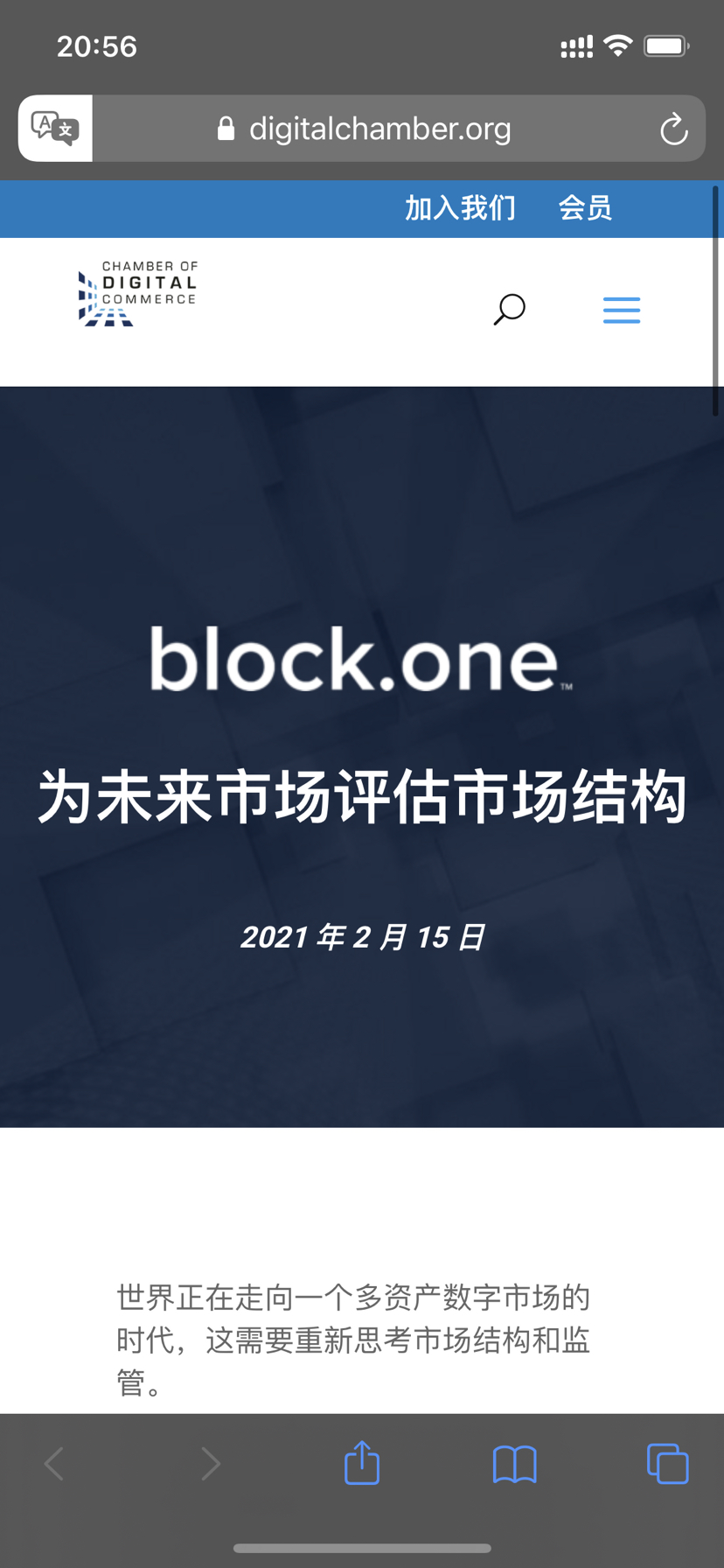世界正在走向一个多资产数字市场的时代,这需要重新思考市场结构和监管。 传统市场有不同的资产或物品的地点。我们既看到了金融资产,股票交易,商品期货交易在不同的专业交易所交易,以及当我们在当地城镇或城市购物时,服装店、电子产品商店、皮革制品商店和个人商店购物时。 随着时间推移,随着超市的出现,这种范式在物理世界中发生了一些变化,这些超市将所有类型的食品和其他家用商品整合到一个空间中。然后是购物中心,聚集了各种专卖店。高潮是几乎卖了一切的“超市”。虽然这种演变在物理世界中需要时间,但亚马逊、eBay和Etsy等在线零售商意识到,他们可以在一个网站上储存和销售大多数任何东西。这些网站成为网上购物的超级商店和购物中心。购物体验可能不如四处闲逛,能够触摸一切并带回家,但它以方便和似乎无穷无尽的选择弥补了这种限制。 与此同时,在金融资产方面,仍然有更传统的安排。证券交易所和商品交易所仍然存在。它们由中介联系在一起,中介促进交易,但你不能去一个地方交易股票换取商品的未来。 金融界正处于交易场所下一次演变的边缘。在完全实现的数字时代,互联网与区块链上的数字资产表示所创造的联系意味着一个市场可以交易任何东西和一切的象征性形式。实际不需要不同的交易场所,可以将一种资产兑换成另一种资产可以直接进行(物项的字面交换)。我们已经看到了这种进化的早期阶段,即所谓的DeFi交易平台,如分散式交易所(“DEx”)。没有在Dex上交易的特定资产类型;任何令牌都可以兑换为任何其他令牌,无论其功能和功能如何。市场格局正在眼前变化! 决策者和监管机构需要理解这一转变,并努力重新构想市场结构监管。这将很困难,因为每个人都习惯于仅按资产类型进行监管,而不是在资产混合的市场进行监管。开始考虑此类法规设计的最佳方式是从第一原则开始。一些核心概念包括:(1)保护卖方和买方免受欺诈和虚假信息的影响,(2)要求所有参与者进行适当披露,(3)通过交易场所运作的透明度促进市场诚信,(4)市场数据标准,以及(5)对中介的要求。 市场上的这些创新将改变我们对购买、出售和交易资产的看法。通过尽早制定原则,政策制定者将为创新和进步奠定基础,这些创新和进步将改善商业,简化准入,并为尽可能广泛的社区:整个世界提供更多的经济和金融机会。 关于作者 李A。施耐德是Block.one的总法律顾问,负责其各种政策举措。长期从事金融服务和技术律师,在区块链领域经验丰富。李与特洛伊·帕雷德斯共同主持了《破坏的胃口》播客,也是《商会与合作伙伴金融技术实践指南》的特约编辑。 关于 Block.one Block.one是一家专门从事高性能区块链软件的全球软件公司。2018年,它发布了EOSIO,这是一个免费的开源协议,旨在为分布式数据库的安全透明基础知识带来速度、可扩展性和易用性。Block.one的风险投资部门EOS VC利用EOSIO技术投资于世界各地的公司、项目和开发商。 有关更多信息,请访问block.one和eos.io。 The world is moving towards an era of multi-asset digital marketplaces, which will require a rethink of market structure and regulation. Traditional marketplaces had different venues for different assets or items. We saw this both for financial assets, with stocks trading on stock exchanges and commodity futures trading on different, specialized exchanges, as well as when we walked around shopping in our local town or city with clothing stores, electronics stores, leather goods stores and individual stores for everything else. This paradigm changed a bit over time in the physical world with the advent of supermarkets that consolidated all types of foods plus other household goods in a single space. Then came shopping malls that brought together all kinds of specialty stores. The culmination was “superstores” that sold nearly everything. While this evolution took time to happen in the physical world, online retailers like Amazon, eBay and Etsy realized that they could stock and sell most anything on one website. These websites become the superstores and shopping malls of online shopping. The shopping experience was perhaps not quite as pleasant as wandering around being able to touch everything and take it home with you, but it made up for this limitation with convenience and a seemingly endless number of choices for everything. Meanwhile, when it comes to financial assets there is still a much more traditional arrangement. Stock exchanges and commodity exchanges still exist. They are linked together by the intermediaries who facilitate trading but you cannot go to one venue to trade a stock for a commodity future. The financial world is on the brink of the next evolution in trading venues. In the fully-realized digital age, the linkages that the internet creates along with digital asset representations on blockchain mean that a single marketplace can trade the tokenized form of anything and everything. There is no physical need for distinct trading venues, and the exchange of one asset for another can take place directly (a literal swapping of items). We are already seeing the early stages of this evolution with so-called DeFi trading platforms like the decentralized exchanges (“DEx”). There is no distinct asset type that trades on a DEx; any token can be exchanged for any other token, regardless of their features and functions. Market structure is changing right before our eyes! Policymakers and regulators need to understand this shift and work to re-envision market structure regulation. This will be difficult because everyone is used to regulating solely by asset type rather than in markets where assets intermingle. The best way to start thinking about the design of such regulations is from first principles. Some core concepts include: (1) protecting sellers and purchasers from fraud and false information, (2) requiring appropriate disclosures from all participants, (3) fostering market integrity through transparency about how the trading venue functions, (4) market data standards, and (5) requirements on intermediaries. These innovations in marketplaces will change the way we think about buying, selling and trading assets. By establishing principles early, policymakers will lay the foundations for innovations and advancements that improve commerce, simplify access and provide greater economic and financial opportunities for the broadest community possible: the whole world. About the Author Lee A. Schneider is the General Counsel of Block.one, with responsibility for its various policy initiatives. He is a long-time financial services and technology lawyer with extensive experience in blockchain. Lee co-hosts the Appetite for Disruption podcast with Troy Paredes and is the contributing editor for the Chambers and Partners Fintech Practice Guide. About Block.one Block.one is a global software company specializing in high performance blockchain software. In 2018, it published EOSIO, a free, open-source protocol designed to bring speed, scalability, and ease of use to the secure and transparent fundamentals of distributed databases. Block.one’s venture capital arm, EOS VC, invests in companies, projects, and developers around the world leveraging EOSIO technology. For more information, visit block.one and eos.io. —- 编译者/作者:一生区块链 玩币族申明:玩币族作为开放的资讯翻译/分享平台,所提供的所有资讯仅代表作者个人观点,与玩币族平台立场无关,且不构成任何投资理财建议。文章版权归原作者所有。 |
b1投稿宣传:profi是未来市场
2021-02-17 一生区块链 来源:区块链网络
LOADING...
相关阅读:
- 根据交易员拉克·戴维斯(Lark Davis)的说法,六种加密资产可能在红热2021-02-17
- 以隐私为中心的硬币边缘遭受大规模重组攻击,开发商表示资金安全2021-02-17
- NYDIG向美国证券交易委员会(SEC)申请比特币ETF,摩根士丹利(Morgan S2021-02-17
- ING银行支持的加密货币交易平台Pyctor正在筹集资金2021-02-16
- DIP005–关于dForce借贷协议首批上线资产的治理提案2021-02-16

